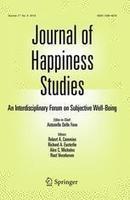(Available in free full text) The claim that most people are happy and satisfied, assuming that high self-ratings on numerical scales indicate good lives, is cross-checked against extensive verbal reports in a large-scale mixed-methods validation study. For a sample of 500 qualitative interviews conducted in Austria, the usual 10-point-scale self-ratings of life satisfaction and happiness were linked to the content of respondents’ actual narrations. Additionally, the narrated well-being was classified according to an alternative evaluation scheme by external raters. The results show that many persons report substantial restrictions to their hedonic experience in spite of high or even very high ratings, and that the narrated well-being evaluation is much more critical than the self-rating. Therefore it is argued that a naïve interpretation of high self-rating values as top life experience systematically ignores negative aspects of life. The claimed predominance of happiness should be substantially reformulated. In particular, more attention should be drawn to resilient satisfaction in the presence of substantial psychological burden, and to the non-negligible group of highly positive life satisfaction ratings which lack evidence of corresponding hedonic experience in the life narratives.
Via Dr James Hawkins



 Your new post is loading...
Your new post is loading...








Las "evaluaciones narrativas" sobre el bienestar son más críticas que las respuestas a escalas de auto reporte, sobretodo respecto a los aspectos hedónicos (de disfrute) de la felicidad.